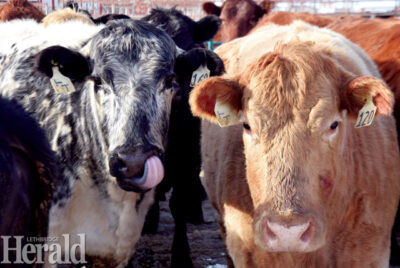Tariffs top of mind for many heading into CattleCon, including the Alberta producers
By Southern Alberta Newspapers on February 5, 2025.
 Southern Alberta NewspApers photo by Collin Gallant
Two cows stand at the Medicine Hat Feeding Company last week in Medicine Hat. Representatives with Alberta Beef Producers are meeting with U.S. stakeholders to discuss the potential impacts of trade tariffs during an annual cattlemen conference held in San Antonio.
Southern Alberta NewspApers photo by Collin Gallant
Two cows stand at the Medicine Hat Feeding Company last week in Medicine Hat. Representatives with Alberta Beef Producers are meeting with U.S. stakeholders to discuss the potential impacts of trade tariffs during an annual cattlemen conference held in San Antonio.Representatives of Alberta Beef Producers are in San Antonio, Texas this week to attend CattleCon, held by the National Cattlemen’s Beef Association, and will meet with U.S. stakeholders to discuss the impact of potential tariffs.
CattleCon is known as the beef industry’s biggest event of the year and over 25 years it has grown into a national conference that attracts more than 8,000 producers from across the U.S. and Canada.
On Tuesday, Alberta Beef Producer representatives reported meeting with stakeholders from Washington, Wyoming and Montana about the impacts of a potential tariff that could be imposed in March.
“We’re looking forward to more great conversations surrounding the importance of integrated trade,” reads an online post by Alberta Beef Producers that says more details will become available shortly.
In a newsletter published Monday by Alberta Grains, the producer-led organization says it’s working together with other organizations to understand the impacts of potential trade tariffs on crops.
“… working across all levels of government and industry in both Canada and the United States to ensure that Alberta crop farmers and all of Canadian agriculture are well represented in these dialogues and ongoing negotiations.”
Alberta Grains has written a collaborative letter to Premier Danielle Smith – together with Team Alberta Crops, Alberta Beekeepers Association, Alberta Canola and provincial livestock groups such as Alberta Pork and Alberta Cattle feeders Association – emphasizing the critical role of agriculture in the province’s economy.
“Proposed tariffs could disrupt this vital economic relationship, diminish market access and undermine the global competitiveness of Alberta’s producers, with significant economic consequences for our province,” reads a portion of the letter that states the tariffs will negatively affect the U.S. economy as well.
Over the past five years the province has exported an average of $6.3 billion in agricultural and agri-food products to the U.S., including grains, canola, beef, pork, potatoes, sugar beets and honey.
“The U.S. export market contributes significantly, both directly and indirectly, to farm incomes in the province, and any tariffs could have detrimental impacts on approximately 57,000 farmers and farm families in the province.”
On Monday, ATB Financial released potential impacts on the province’s economy if a 25 per cent tariff is imposed on Canadian goods imported into the U.S., followed by matching counter tariffs on $30 billion in U.S. goods coming into Alberta.
ATB Economics has published a low-case or “pessimistic” scenario that includes a 25 per cent tariff on Alberta’s non-energy exports and a 10 per cent tariffs on energy exports. The scenario shows high exposure for sectors liked food, chemical, machinery and wood products.
“The U.S. is the largest market for almost all of Alberta’s industries, making the tariff difficult to avoid by diverting to other markets,” says ATB, whose scenario estimates the province’s total GDP growth in 2025 to drop 2.9 per cent below forecast in 2026, with unemployment 2.2 per cent higher in 2026.
“This scenario is not a forecast, but an illustration of what could happen,” reads the report. “Duration is key. The longer the tariffs are in place, the more likely it is that businesses will curtail production and reduce investment.”
15-14


